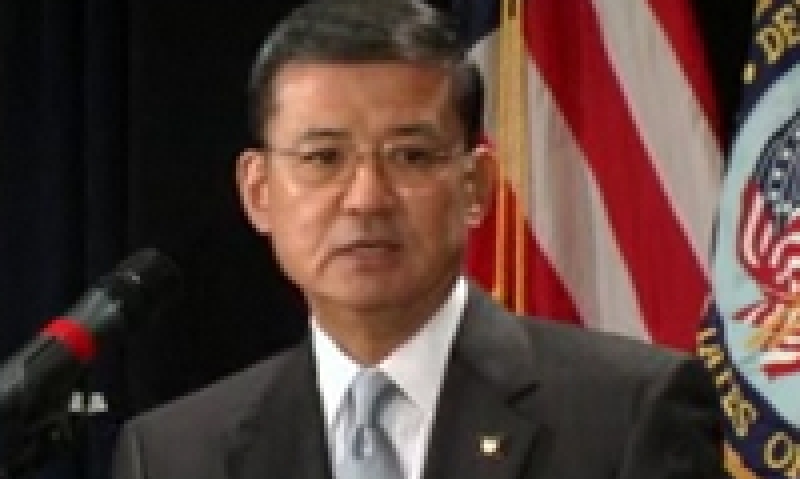
VA secretary praises those who devote their time, effort toward helping America's veterans during NAC meeting.
Jacob B. Gadd, assistant director for Program Management in The American Legion Veterans Affairs 7 Rehabilitation Division, recently attended the VA Voluntary Service National Advisory Committee annual meeting in Cincinnati. The following are VA Secretary Eric Shinseki's remarks to the committee.
I expect all of you are here for the same reason. If you are not grateful for the men and women who have served our country in uniform, you simply wouldn't be here tonight. That's true, both for volunteers, and for VA employees. Once you've had a chance to meet our veterans-to hear what they've done, and see how some have suffered, you can't help but feel immense pride and respect for them.
Now, after 14 months as secretary, I feel the same way about VA volunteers. I'm amazed at how much they do, and I'm touched by your generosity in giving of your time, talent, and resources to care for veterans. The world would be a lot better place if everyone just did a good deed now and then.
But the truth is that "random acts of kindness" are not enough. The world cannot thrive this way. What is most needed are people who are regularly, habitually, and deliberately kind and giving-people who make caring for others a personal devotion, a part of their everyday life. That's the kindness and commitment we most need.
Someone once wrote that "volunteers don't get paid-not because they're worthless, but because they're priceless." Well, at VA, we've tried to put a price on our volunteer contributions, and we've calculated that it totals $323 million-$240 million in labor, plus $83 million in donations. And that's a conservative estimate. If we had to pay the going rate for everything volunteers do, we would simply not be able to afford your services.
Because it is simply impossible to put a dollar value to everything. How much does a sincere thank-you cost? How about an hour of patience? What's the going rate for dignity and respect for one of our combat veterans? Such values cannot be calculated, yet they mean so much to veterans. We can no more put a price on kindness, than we can put a price on heroism.
Jerry Murphy grew up in Pueblo, Colorado. He joined the Marine Corps after college and was soon a platoon commander during some dark days on the Korean peninsula.
In February 1953, Murphy's platoon was held in reserve while the rest of the company staged a raid on a heavily fortified hilltop. The company was supposed to take the hill, then withdraw before the Chinese counterattacked. But most of the company's officers and NCO's were killed or wounded in the assault, and the battered company was left leaderless on the objective.
From below, Murphy could see that something was wrong-the company wasn't withdrawing as planned. On his own initiative, Murphy first reconned the hilltop, then led his platoon forward to organize the withdrawal. Murphy himself scoured the hill for missing Marines. He left his rifle so he could carry the wounded and recover the dead. He was up and down the hill numerous times, and was twice wounded in his efforts-but he refused medical attention until he was sure that no Marine was left behind.
None were, and Murphy was the last man to leave that bloody hilltop. For voluntarily risking his life to bring back his fellow Marines, 2Lt Murphy was awarded the Nation's highest award for valor-the Medal of Honor.
But his record of service didn't end there. In later life, Jerry served 23 years as a VA counselor and Director of Veteran Services in Albuquerque. And, after finally retiring from federal service, he served another eight years as a volunteer at the Albuquerque VA Medical Center.
Before he died in 2007, Murphy told his wife he wanted to be buried in his VA volunteer jacket-and he was. Coming from a Marine and Medal of Honor recipient, that's strong testimony to the fulfillment that comes with volunteer service.
Jerry Murphy was first and last a volunteer. It was his selfless concern about the well being of others that led to his heroic actions in Korea. And he didn't stop being a hero when he left that hilltop-he lived his whole life as one. The same kindness, the same shared sense of humanity, that drove him up that hill in search of fellow Marines, also motivated his years of service to veterans.
Volunteering is always ennobling. It is the one job in life no one can ever fail at. Everyone who volunteers earns both praise and thanks. Tonight, you have mine.
Congratulations to all those we will be honoring here this evening, and my deepest thanks to every one of you-and to the many others you represent-for your truly heroic efforts on behalf of America's veterans.
God bless our men and women who serve in uniform, God bless our veterans, God bless our volunteers, and God bless this wonderful country of ours. Thank you.
- Volunteers

